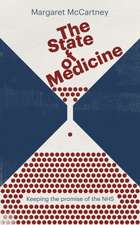Collective Consciousness and Its Discontents:: Institutional distributed cognition, racial policy, and public health in the United States
Autor Rodrick Wallace, Mindy T. Fulliloveen Limba Engleză Paperback – 4 noi 2010
This book takes a more formal 'groupoid' perspective and generalizes the results of that book to processes of 'distributed cognition' characteristic of large institutions that can entertain several, sometimes many, simultaneous 'global workspaces' which must compete for resources while communicating and cooperating.
Equivalence classes of 'states' produce a network of language-analogs characterizing interacting cognitive modules which entertain multiple workspaces. Equivalence classes of these language-analogs produce dynamical manifolds describing temporal processes carried out by multiple-workspace institutions.
| Toate formatele și edițiile | Preț | Express |
|---|---|---|
| Paperback (1) | 711.32 lei 6-8 săpt. | |
| Springer Us – 4 noi 2010 | 711.32 lei 6-8 săpt. | |
| Hardback (1) | 718.10 lei 6-8 săpt. | |
| Springer Us – 17 dec 2007 | 718.10 lei 6-8 săpt. |
Preț: 711.32 lei
Preț vechi: 748.76 lei
-5% Nou
Puncte Express: 1067
Preț estimativ în valută:
136.13€ • 147.81$ • 114.35£
136.13€ • 147.81$ • 114.35£
Carte tipărită la comandă
Livrare economică 23 aprilie-07 mai
Preluare comenzi: 021 569.72.76
Specificații
ISBN-13: 9781441945747
ISBN-10: 1441945741
Pagini: 216
Ilustrații: X, 206 p. 14 illus.
Dimensiuni: 155 x 235 x 11 mm
Greutate: 0.31 kg
Ediția:Softcover reprint of hardcover 1st ed. 2008
Editura: Springer Us
Colecția Springer
Locul publicării:New York, NY, United States
ISBN-10: 1441945741
Pagini: 216
Ilustrații: X, 206 p. 14 illus.
Dimensiuni: 155 x 235 x 11 mm
Greutate: 0.31 kg
Ediția:Softcover reprint of hardcover 1st ed. 2008
Editura: Springer Us
Colecția Springer
Locul publicării:New York, NY, United States
Public țintă
Professional/practitionerCuprins
Consciousness And Distributed Cognition.- Formal Theory.- Pathologies Of Collective Consciousness.- Disease And Collective Consciousness.- The Failure Of Aids Control And Treatment In The Us.- Final Remarks.- Mathematical appendix.- References.
Recenzii
From the reviews:
"This book describes the mathematical analysis of collective consciousness, with a focus on the relation between public policy and public health, specifically AIDS and TB. … The authors do not indicate who their intended audience is, but researchers and individuals interested in public health and racial policy would be appropriate. … presents some very important ideas in public health and racial policy, presenting them in the context of the collective consciousness. The case studies at the end help to bring out the important points." (Gary B Kaniuk, Psy. Doody’s Review Service, March, 2008)
"This book describes the mathematical analysis of collective consciousness, with a focus on the relation between public policy and public health, specifically AIDS and TB. … The authors do not indicate who their intended audience is, but researchers and individuals interested in public health and racial policy would be appropriate. … presents some very important ideas in public health and racial policy, presenting them in the context of the collective consciousness. The case studies at the end help to bring out the important points." (Gary B Kaniuk, Psy. Doody’s Review Service, March, 2008)
Textul de pe ultima copertă
This book expands a recent mathematical treatment of the Baars model of individual consciousness to an institutional venue in which multiple ‘Global Workspaces’ cooperate, communicate, and compete. The result is an expansion of Dretske’s necessary conditions communications theory approach to high level cognition, having potential applications ranging from the organizational ecology of the firm to the design and analysis of highly parallel or networked autonomic computing systems. The particular example explored in detail, the failure of AIDS control and treatment in the United States, generalizes distributed cognition approaches to medical error and applies them to larger scale patterns of failure in public health, affecting populations rather than individuals. The book is written as a series of nearly independent chapters, and can be read at markedly different mathematical levels.
Caracteristici
Applies a multiple-workspace version of Dr. Wallace’s earlier consciousness model to large-scale institutional cognition Uses the extended theory to understand recent patterns of interaction between public policy and public health in the U.S.










